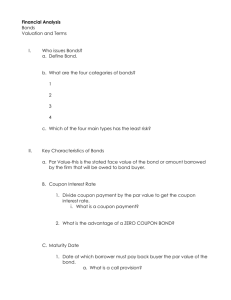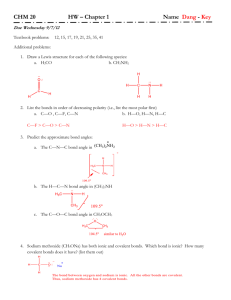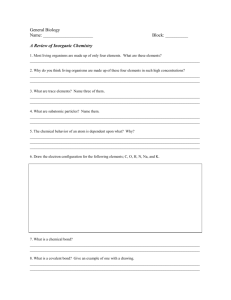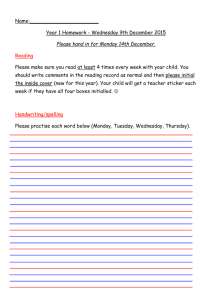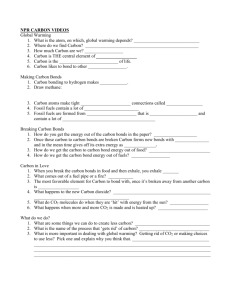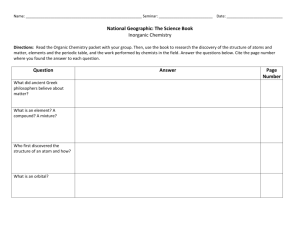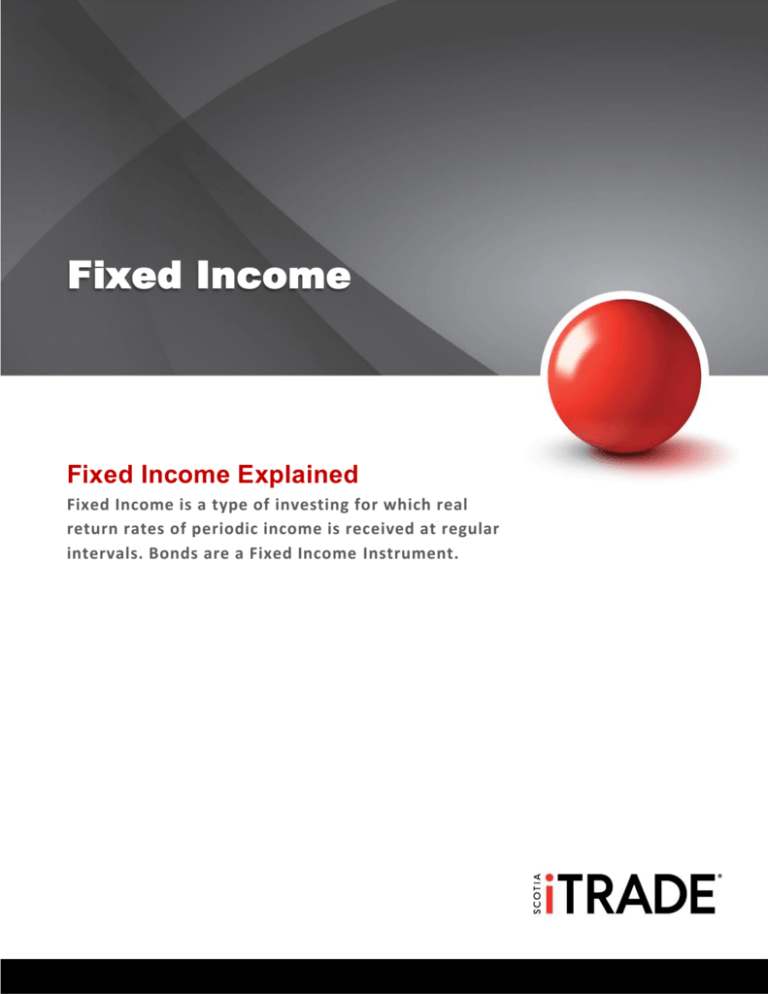
Lorem ipsum dolor
Sit amet, consetetur sadipscing elitr, sed diam nonumy
eirmod tempor invidunt ut labore et dolore magna
gubergren, no sea takimata sanctus est Lorem ipsum
dolor sit amet.
Fixed Income
Fixed Income Explained
Fixed Income is a type of investing for which real
return rates of periodic income is received at regular
intervals. Bonds are a Fixed Income Instrument.
Fixed Income
Fixed Income is a type of investing for which real return rates
of periodic income is received at regular intervals. Bonds are
a Fixed Income Instrument.
What are Bonds?
Bonds Explained
A bond is a debt instrument usually issued by a
Government or a Corporation at Face Value,
also known as Par Value. The buyer of the bond
is paid interest, the Coupon Rate, usually semiannually - this is the buyer's return or yield on
the bond. Upon maturity, the buyer of the bond
expects to be repaid their original investment at
face value or par. Technically, a bond has
specific assets pledged against the loan,
whereas a debenture does not. In practice
however, the word "bond" is applied to any
kind of term debt, collateralized or not.
Bonds may also be resold at varying prices
according to market conditions, between
buyers. However, when bonds are purchased
between coupon payments, the buyer must pay
the seller the Accrued Interest (or accumulated
interest) from the last coupon payment until
the transaction settlement date. The buyer will
then receive a full interest payment at the next
coupon date, recouping the accrued interest
they paid at purchase.
Example
An investor purchases $50,000 in Government
of Canada bonds that mature in 5 years. The
buyer is paid semi-annual interest payments
over the course of those 5 years and then
redeems the bonds' full face value of $50,000
when the bonds mature. Coupon payments (or
interest payments) vary.
2
Fixed Income | Scotia iTRADE
Inventory Search Tool
A balanced portfolio that mixes Fixed Income investments, equities, and other investment
options can be a key to successful long-term financial planning. At Scotia iTRADE you can buy
and sell Canadian or US dollar-based Fixed Income products. Start by searching through one of
the largest online bond inventories for the Fixed Income product that meets your investment
criteria. Choose amongst various types of Fixed Income products including federal, provincial
and corporate bonds, strip coupons and residual bonds, or from T- Bills, commercial paper and
bankers' acceptances (known collectively as Money Market instruments). Access the tool from
the ‘Trade’ tab on Scotia OnLine and select ‘Fixed Income’
Use Scotia iTRADE’s Inventory Search tool to look through our Fixed Income inventory
to select the specific Fixed Income security that is right for you. Start by
Selecting a particular product type: bonds, coupons/residuals, T-Bills and Money
Market
Specifying the maturity term of the bond you are looking for
Specifying the rating
Specifying the coupon rate
Specifying the price range
Or specifying the current yield
3
Fixed Income | Scotia iTRADE
Bond Ratings
Is There A Minimum Order?
More information on bond ratings can be found
at standardandpoors.com
Bond orders must be for at least $5,000 face
value or 5 whole bonds; each bond has a face
value of $1,000. Orders must be placed in
increments of $1,000. Minimum orders for
Canadian Government T-Bills are $10,000 face
value. Minimum size and increments for strip
bonds varies by issue.
Standard & Poor's maintains ratings on more
than 300 Canadian companies, governments,
and public agencies. They have been rating
Canadian conventional-term debt and generalobligation bonds since August 1949.
Another great source is the Dominion Bond
Rating Service (DBRS) at dbrs.com.
Dominion Bond Rating Service (DBRS) was
formed in 1976 to rate issuers of commercial
paper in Canada and now also rates issuers of
bonds and preferred shares in the Canadian
marketplace.
How Are Bonds Sold?
Bonds are sold between buyers at varying prices
according to market conditions. If you purchase
bonds between interest, or coupon payments,
you must pay the seller the accrued interest (or
accumulated interest) from the last coupon
payment until the transaction settlement date.
You will then receive a full interest payment at
the next coupon date, redeeming the accrued
interest you paid at the time of purchase.
4
Types Of Bonds
Stripped, or Zero Coupon, Bond
A Stripped Bond (or Zero Coupon Bond) is
a bond that is sold at a discount, but pays
no interest (or coupons) during its life. The
discount represents your return on the
original investment if the bond is held to
its maturity date.
Redeemable Bond
A Redeemable Bond, or Callable Bond,
allows the issuer to 'call' the bond before
its maturity at the specified date(s) at a
defined call price. Usually, the call price
exceeds the face value, or par value, of the
bond and includes accrued interest.
T-Bill
T-Bills are discount instruments issued by
the federal government at a weekly
auction. Generally, they offer original
maturities of 13 weeks (3 months), 26
weeks (6 months) and 52 weeks (1 year)
Fixed Income | Scotia iTRADE
Types of Orders
All bond orders are entered as market orders and are executed at the best price available at the time
the order is executed. Please note that the price at which your order is executed could be different from
the price quoted when you placed your order. The reason is that the market is dynamic. Prices are
changing continuously in the market as the minutes and seconds go by.
Invest in Fixed Income
Orders are executed in accordance with
prescribed priority rules, delays in execution
can occur due to market demand of a security,
and in the meantime the market price can
change as a result of investor demand and
other factors. Market orders will be executed
(subject to the availability or the liquidity of the
security) but they are not guaranteed an
execution at a specific price. Large orders can
take longer to fill and move the market
sometimes to your disadvantage.
5
Select Account
Select Fixed Income
Select Buy or Sell
Select Issuer, Maturity, and Rating
Select Limits for Coupon, Offer Price,
and Offer Yield (optional)
Search
Fixed Income | Scotia iTRADE
Once you selected ‘Search’, you will be redirected to a result page from which you can decide
which Fixed Income you want to buy.
Once you select ‘Buy’, fill in the your trade ticket with the quantity you wish to purchase and
click on ‘Preview’ before entering your Access Code and submiting the order.
6
Fixed Income | Scotia iTRADE
Fixed income Order Entry Guidelines - Minimum Face Value
For Government of Canada, Provincial, Municipal and Corporate Bonds, the minimum transaction
Face Value of the order is $5,000.
For Strip Bonds, the minimum transaction Face Value of the order is $5,000.
For Government of Canada T-Bills the minimum transaction Face Value of the order is $10,000 and
for Provincial T-Bills the minimum transaction Face Value of the order is $25,000
Face Value Order Quantities
Except in the case of Strip Bonds, Face Value must be in multiples of $1,000 as there are generally no
fractional bond units available. Strip bonds are generally available in increments of $1.00 as long as the
minimum Face Value requirement is met.
How Can I Learn More About Fixed Income?
Scotia iTRADE offers great Quotes & Research on Fixed Income. For example, you have the option to
compare Fixed Income and read Fixed Income Reports, such as Corporate Bond Weekly or Global
Forecast Updates.
7
Fixed Income | Scotia iTRADE
To learn more about Fixed Income and Fixed Income Tools, join our Webinars or
view our Webinars on Demand.
8
Fixed Income | Scotia iTRADE
Mailing address
Investor Information Centre
Scotia iTRADE
PO Box 4002 Station A
Toronto, ON
M5W 0G4
48 Yonge Street (Yonge/Wellington)
Toronto, ON, M5E 1G6
Tel: 1-888-769-3723
Email: education@scotiaitrade.com
Scotia iTRADE® (Order-Execution Only Accounts) is a division of Scotia Capital Inc. ("SCI"). SCI is a member of the Investment
Industry Regulatory Organization of Canada and the Canadian Investor Protection Fund. Scotia iTRADE does not provide
investment advice or recommendations and investors are responsible for their own investment decisions. ®Registered trademark of
The Bank of Nova Scotia. Used under license.
© Scotia iTRADE 2014. All Rights Reserved.

